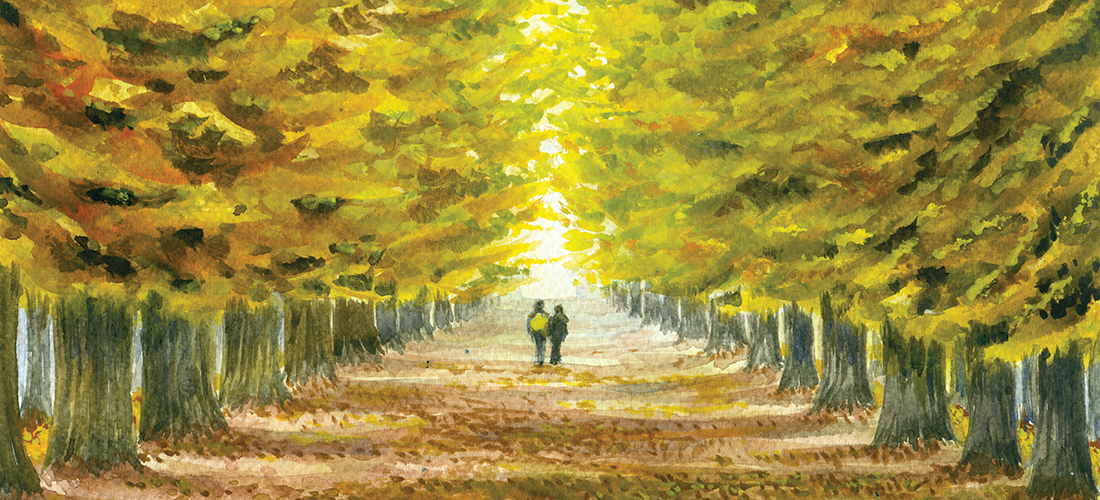
Walking the Talk
And seeing the gifts of being human
By Maria Johnson
I arrive at the trailhead with a cardboard box full of dirt-crusted iris bulbs, leftovers from a gardening operation best described as dig, divide and conquer by giving. My friend has asked for some of the remainders, which I promised to bring the next time we walked.
She totes a gift, too, a surprise — a first edition copy of Where Trouble Sleeps, a short novel by one of my favorite authors, North Carolina’s own Clyde Edgerton. She salvaged the book from a Salvation Army that she regularly scans for vintage finds.
We swap treasures in the parking lot, leash our dogs and set off on a long trek through the woods, a practice we repeat a couple of times a month, if not weekly.
I’m betting that each of us is a little nervous this time. I know I am.
The results of the general election are pending, and we’re on opposite sides of the fence, politically speaking, which basically means we’re not speaking politically.
It wasn’t always this way. Eight years ago, when we met, we agreed on much more, or so it seemed. But in the last four years, the subject of politics, especially presidential politics and its spin-offs, has become increasingly flammable, with each of us quick to defend our beliefs and each of us — I’m quite sure — shaking our heads and asking ourselves about the other: “How could someone so smart, compassionate and patriotic think that?”
But we’ve kept walking.
And talking.
And laughing.
About sons, and husbands, and dogs, and movies, and dialogue we’d witnessed or overheard or imagined.
Sometimes, a giggle couldn’t wait a week. Before Halloween, she texted a flight of imagination: “OK, hear me out . . . Haunted house but with adult nightmares.”
In one room, actors frolic on vacation until they get a call saying the water pipes in their house have burst. It’s a weekend. A holiday weekend. No plumbers can be located. Blood-curdling screams pierce the air.
In another room, a flannel-clad innocent in a cozy bed wakes to realize he has slept through an important meeting. He throws off the covers and flails in panic, a sure goner.
In another room, the help desk from hell, the unwitting victim sits at a computer, reading an avalanche of emails saying the customer service department is awaiting her reply — which she keeps sending.
“Instead of ghouls jumping out at you, it’s bureaucrats and middle-managers yelling and laughing,” my friend wrote by way of stage direction.
I added a chilling scene:
An unsuspecting shopper stands in a check-out line that’s inching forward. She moves to a faster-moving line only to have the cashier in that line call for a price check. Meanwhile, the person who was in front of her in the first line skips out the door while the manager announces over the loudspeaker, “Will the driver of a white Prius (her car) please come to the customer service desk.”
“NOOOOO!,” my friend texted.
Each of us knew the other was laughing out loud.
I supposed that was — and is — the tie that binds: amusement at fate and foibles, the flaws and fears that all of us share, a recognition of how loveably ridiculous humans are.
That includes . . . drumroll . . . us. Half the doozies we tell are on ourselves.
OK. Maybe a third of the tales.
All right. A quarter. Take it or leave it.
So there’s that. And there’s cussing. We love to cuss. Add a dash of the sublime and splash of the serious. The wildflowers we discover on our walks. The tears we’ve shared at touching stories. The curiosity piqued by things we’ve read.
And yes, the bleep-ing politics.
“I’ll be glad when this election is over,” she ventures halfway through the walk.
“Me, too,” I say.
We sidestep for a moment to rail about repair people who’ve left jobs unfinished at our houses, each waiting on a part that never seems to arrive.
“I guess it’s made of unobtainium,” my friend says.
Unobtainium? How can you not love someone who uses a word like that?
The conversation skips and skitters. The trail falls, rises, curves, straightens. We land on the topic of negotiating.
I stick my neck out: My candidate is a good negotiator, I say.
A good negotiator who happens to be wrong, she says.
At least he admits when he’s wrong, I say.
Here we go again.
We step carefully, catching our balance with small talk about the dogs.
Now, she sticks her neck out: It’s hard to understand someone else’s experience when you’re negotiating.
It’s true, I say, especially if you’re playing for points, tit for tat.
The only way out, we agree, is to give, trusting that you won’t be hurt in the process.
No trust, no give.
We’re back at the cars now. The dogs are loaded up.
Thanks for the bulbs, she says.
Thanks for the book, I say.
Seeya next week, she says.
Seeya next week, I say. OH
Maria Johnson is a contributing editor of O.Henry. She can be reached at
ohenrymaria@gmail.com





